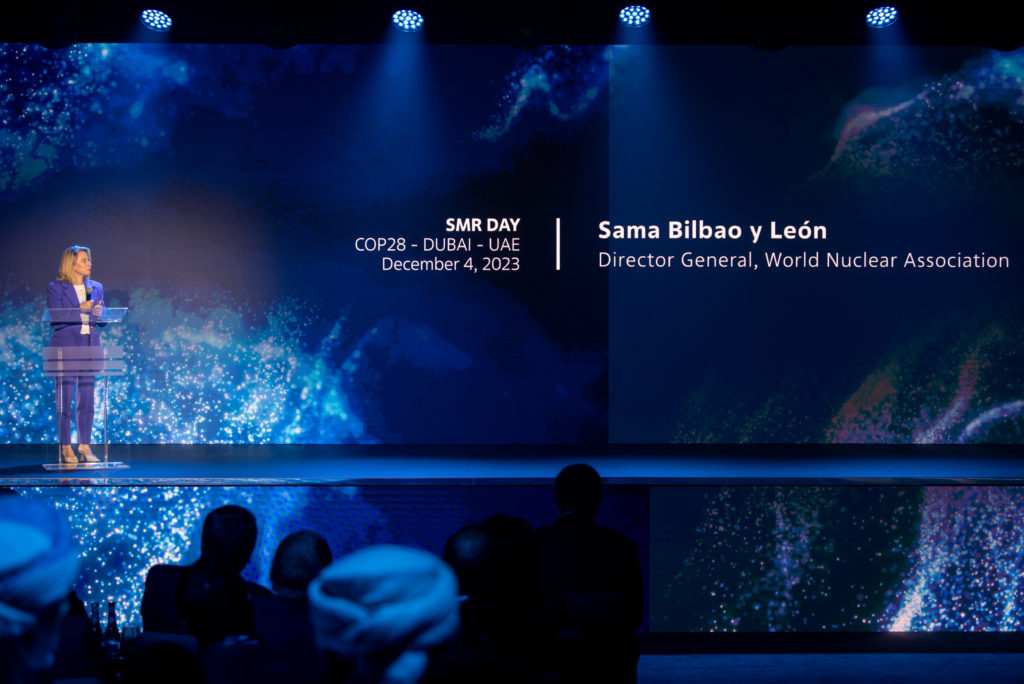The event became an international platform for discussing the advantages of developing small modular reactors
Rosatom State Corporation held the Small Modular Reactors Day (SMR Day) on the sidelines of the COP28 Climate Conference, presenting a full range of technological solutions to achieve climate goals and ensure a low-carbon future. For the first time, the SMR Day was held with the support of Rosatom at EXPO-2020.

“We are convinced that nuclear energy will inevitably become the foundation of the low-carbon balance we all strive for. Low-capacity nuclear power generation, as one of the reliable technological solutions, will occupy a worthy place in the future of nuclear energy. I am confident that Rosatom’s proposals in the field of small modular reactors will become an effective and environmentally friendly choice for those countries that, for various reasons, have not considered nuclear generation before,” noted Alexey Likhachev, Director General of Rosatom, in a video address to guests and participants of the SMR Day.
The event opened with a colourful multimedia show demonstrating the importance of preserving harmony between humans and nature in Yakutia, where Rosatom has started the implementation of a unique low-capacity nuclear power plant project. The power plant, designed to boost the region’s development, is being constructed with careful consideration for the fragile Arctic ecosystem. The commissioning of the land-based SMR in Yakutia is planned for 2028. In addition to the presented project, Rosatom’s portfolio also includes the world’s only floating nuclear power plant (FNPP), the “Akademik Lomonosov”. Since its commercial operation began at the end of 2019, the FNPP has generated over 700 million kilowatt-hours of electricity for Pevek, the northernmost city in Russia. Based on this experience, work is underway on the next-generation floating power unit technology based on the RITM-200 reactors. It is planned that by 2029, they will start supplying power for the development of the Baimskaya ore zone in Chukotka. Rosatom is also implementing the “Shelf-M” microreactors project with a capacity of up to 10 MW. The first plant based on this technology is expected to be operational by 2030.
“There are more than 70 small modular reactor projects in the world in the design stage. Rosatom is the only technology company that has moved from words to action. Today, by implementing our projects for Yakutia and Chukotka, we set ourselves the task of demonstrating the economic efficiency and reliability of SMRs. Creating a referent project in the Russian Far East will open up a huge market for this technology, just as the reference of Russian NPPs based on VVER-1200 Gen III+ reactors showed the world that nuclear energy is a safe solution to the issue of climate change. We are confident that the experience gained in the coming years will allow us to offer our partners around the world the best solutions in the field of SMRs,” said Kirill Komarov, First Deputy Director General for Development and International Business of Rosatom.

Speakers at the SMR Day panel discussion also included the Director General of the World Nuclear Association, Sama Bilbao y Leon, and high-ranking representatives of relevant ministries and energy companies from different countries. Participants in the discussion talked about how SMRs can address a wide range of national development tasks.
At the conclusion of the SMR Day, the Rosatom leadership presented the concept of an SMR project for Mongolia to Dalaijargal Dorjbal, Executive Director of the Mongolian state company “MonАtom”. The ceremony marked the development of cooperation between Rosatom and foreign partners and confirmed the demand for small modular reactor technologies in international energy markets.
For reference:
The UN Climate Change Conference is the largest forum focusing on climate issues and serves as the highest body for the negotiation process to implement the provisions of the UN Framework Convention on Climate Change (UNFCCC), the Kyoto Protocol (KP), and the Paris Agreement (PA).
Rosatom State Corporation has been operating in line with the principles of sustainable development for many years. Sustainable development principles are incorporated into Rosatom’s long-term strategy. In 2020, the Unified Industry Policy on Sustainable Development was adopted. In the same year, Rosatom joined the UN Global Compact, the largest international initiative for business in the field of corporate social responsibility and sustainable development. Rosatom is the largest producer of low-carbon electricity in Russia, accounting for about 20% of the country’s total electricity production.
Small modular reactors are one of the most promising technologies in the nuclear industry, with all key players working on developing their own solutions based on SMR technologies. These solutions are aimed at providing uninterrupted clean electricity and heat to remote and island territories, supporting the development of promising deposits. Rosatom has reference technologies for the construction of both floating and land-based SMRs. Rosatom’s low-capacity nuclear power projects offer a reliable source of electricity with a long-term predictable tariff for consumers. This makes SMR technologies in demand for large industrial consumers who responsibly choose their energy sources for their production and presence territories.
In Russia, increased attention is being paid to the development and implementation of new technologies aimed at environmental protection. Rosatom, producing electricity through low-carbon generation, is consistently taking steps towards transitioning to a green economy. Reducing the negative impact on nature, preserving and replenishing bioresources – these are the priority tasks of the Russian nuclear industry in environmental protection. Rosatom pays great attention to the modernization of equipment that ensures the generation of environmentally friendly energy, annually allocating hundreds of millions of rubles to environmental protection activities. Rosatom participates in projects to preserve biodiversity on our planet, engages in reforestation, riverbank cleaning, and fish stocking of water bodies. Nuclear energy can make a significant contribution to the fight against climate change due to the absence of CO2 emissions in the energy generation process, which is crucial for many countries.
Russia actively develops cooperation with friendly states. Despite external constraints, the domestic economy is increasing its export potential, delivering goods, services, and raw materials worldwide. Large foreign energy projects continue to be implemented. Rosatom and its divisions actively participate in this work.
